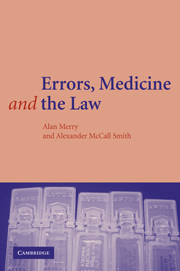8 - Beyond blame: responding to the needs of the injured
Published online by Cambridge University Press: 05 October 2013
Summary
Our concern in this book has been to assess how we respond to accidents – with a focus on accidents in medicine. We have indicated that many events which are judged to constitute instances of medical negligence are, in fact, the inevitable concomitant of human limitations in the face of demanding situations. We have argued for a re-examination of the process of the allocation of blame in such cases and suggested that an excessive focus on fault may be unjust and counter-productive to the improvement of safety. Such claims, though, may easily be misinterpreted. It might be thought that to argue against an undue emphasis on blame is to favour the doctor and pay inadequate attention to the plight of the injured patient. After all, this is not merely a matter of academic interest but concerns real people who have suffered injury.
One might recall at this stage the studies (reviewed in chapter 2) which show just how extensive the harm from error and negligence in medicine may be. As we have pointed out, estimates as to incidence vary, but the central conclusion is clear: too many patients are being harmed in this way, often quite seriously. Behind these statistics there exists substantial suffering, not only in the shape of the pain and discomfort of physical injury but also in financial terms, with loss of earnings and costs associated with disability. In general, however blameless the doctor, the patient is even less to blame for the injury.
- Type
- Chapter
- Information
- Errors, Medicine and the Law , pp. 204 - 240Publisher: Cambridge University PressPrint publication year: 2001



